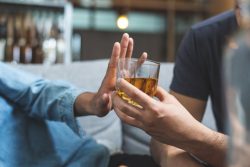How Your Nightcap Can Worsen Your Sleep Apnea
April 15, 2021
Studies have found that 15 – 18% of people use alcohol to help them fall asleep. Some do so just occasionally, while others rely on their nightly drink as a way to unwind and get some shuteye. While it is true that alcohol can help you fall asleep faster, it shouldn’t be used as a sleep aid, especially if you have obstructive sleep apnea (OSA). Let’s talk about the negative relationship between alcohol and sleep apnea in Melbourne.
Alcohol and Sleep Apnea
Alcohol is a central nervous system depressant. It interacts with the brain to relax muscles throughout the body. This includes the muscles in the throat. When they overrelax, they are more likely to block your upper airway and contribute to apneas (pauses in breathing) throughout the night. Alcohol consumption can lengthen the amount of time you spend without breathing, which leads to decreased oxygen levels and higher levels of carbon dioxide in your blood. This condition, called hypercapnia, can be fatal in severe cases.
That isn’t the only way in which alcohol can affect sleep apnea. It has a generally negative affect on your drive to breathe. There is even research showing that alcohol can cause apneas and snoring in people who otherwise do not suffer from OSA.
Should You Abstain from Alcohol?
It is best for individuals with OSA to avoid alcohol altogether. However, if you do choose to drink, there are some steps you can take to lessen the chance that it will worsen your sleep apnea:
- Do not drink during the last several hours before bedtime. If your alcohol is fully metabolized before you go to sleep, that would be ideal. On average, it takes about one hour for one standard drink to be eliminated from the human body.
- Drink in moderation. It is generally recommended that men have no more than two drinks a day, while women should limit themselves to one drink.
- Follow your OSA treatment instructions from your physician and/or dentist. Diligently complying with your sleep apnea treatment in Melbourne — for example, by using your oral sleep appliance as directed — can lessen alcohol’s negative effects on your OSA.
- Watch out for interactions. Combining alcohol with certain types of medications, such as muscle relaxers, can amplify its effects.
Tips for Falling Asleep Faster
Here are some things you can do instead of drinking alcohol to help you fall asleep faster:
- Stop using your electronic devices about an hour or two before bedtime.
- Keep your bedroom temperature on the cooler side.
- Use breathing exercises to help you relax.
- Invest in a high-quality mattress and pillows.
- Spend your evenings doing something relaxing.
- Engage in plenty of physical activity during the day (just not right before you try to sleep).
Alcohol before bedtime can worsen OSA! It’s best to skip your nightcap and use other means to help you fall asleep.
Meet the Sleep Apnea Expert
Dr. Kenneth Mogell is a general dentist with more than a decade of experience in treating sleep apnea via oral appliance therapy. He is double board certified in dental sleep medicine and has helped countless individuals throughout the years. If you have questions about OSA and the treatments that are available for it, he would be pleased to talk with you. Contact our Melbourne office at 321-313-5350.
